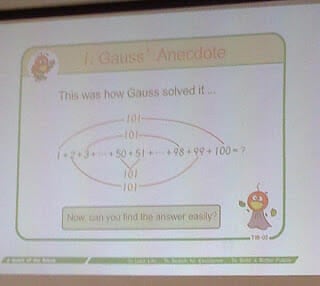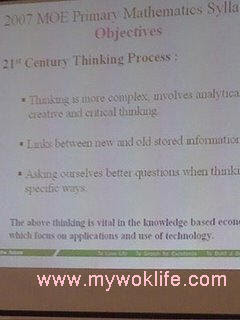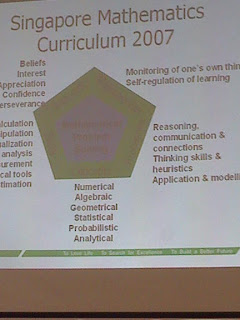“New Concepts, New Habit in Singapore Mathematics for lower Primary students and Parents’ attitude”
I am back! Back? Yes, back from an educational workshop on helping our children to handle Mathematic and Exam conducted this afternoon, at Queenstown Library.
Mathematics subject. Singapore Mathematics is well-knowingly advance, in another word, it is tough. Parents would try their best to send them to tuition centre, despite full day studies in the school. Parents would also try to teach them at home, buy more assessment books for them to practice.
However, due to limitation in time, teaching skill and most of all, patience, parents want to see result in the children fast and accurately. We will mostly end up with more frustration, agitation and adding pressure to the children!
I attended this workshop organized by MPM New-Maths Learning Centre, as media invite. No doubt, it was purposed to promote their new centre opened at Queensway, but they did preach the parents who attended this workshop on proper attitude and more effective ways to teach and monitor the children (who are in lower primary) in their Mathematics learning. They reminded the parents to adopt the latest change of Singapore Mathematics Curriculum from 2007.
During this workshop, the speaker emphasized on “Thinking Habit”, the new syllabus in Singapore, changed from “Thinking Skill” in 2002 to “Thinking Habit” since 2007. Think habit? It refers to not only your children have to acquire thinking skill, they have to make ‘thinking’ their habit. Learning by heart or excessive practices on assessment book or/and ‘10-years series’ (past examinations papers) are no longer the trend, students have to develop creative problem-solving techniques and analytic skills. According to latest Singapore MOE mission statement (since 2004), “Teach Less, Learn More”, our teachers are guided to transform learning from quantity to quality. “Teach Less, Learn More” exposed these students to more pictorial and paradigmatic concepts in analyzing the mathematics questions as well working out the calculations effectively.
I was pretty surprise to know from this workshop that P6 students are allowed to bring calculator to their PSLE. I thought using calculator in exams will happen only in secondary examinations!
In the workshop, the speaker had also illustrated the difference between using problem-solving skill versus simple calculation skills to solve a question, using the famous “Gauss” example.
1+ 2 + 3 + 4+…… 50+ 51+…….99+100 = ?
Calculation skills user will simply add it up starting from the first number which will take the student at least 30 min to finish this question and, with the risk of adding it up wrongly during the long add-ups.
While problem-solving user will be able to ‘see” the in-common between all the numbers, and thus, solve this sum with less than 7 min. See the picture!
The speaker did mention some DOs and DON’Ts for the parents which act as reminder to us:
Do:1) Ensure child understands concepts across topics,
2) Use tools and concrete objects for child to perform hands-on manipulation, activity based learning, followed by pictures and then symbols, prompt child to discover answer,
3) Review with child by asking her/him to teach you instead
4) Regulate child’s thinking by asking specific question leading the child to derive answer by her/himself,
Don’t:1) Drill child to repeatedly work on excessive assessment books,
2) Kill child interest and confidence in learning,
3) Ask child to memorise without understanding,
4) Provide direct answer to child or spoon-feed the child with solutions.
Overall, this is quite a good workshop as a refreshment, reminder or fresh knowledge in helping your children in their early learning journey. Just some comments on the speaker, sad to say that, she looked a little intense on her expression and sounded tactless in her speech. Perhaps, she teaches for more than 6 years (eye-rolling).
Anyway, the most beneficial gain from this 2-hour workshop to me, is the reminder of “being patient” when teaching your child. I believe this is the key leading to the success of having your child learnt with interest, in whatever subject.
If the location suits you, the course fee is pretty reasonable for this New-Math tuition, $155 for 8 lesson (min. 3 month commitment).



